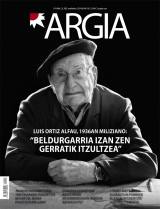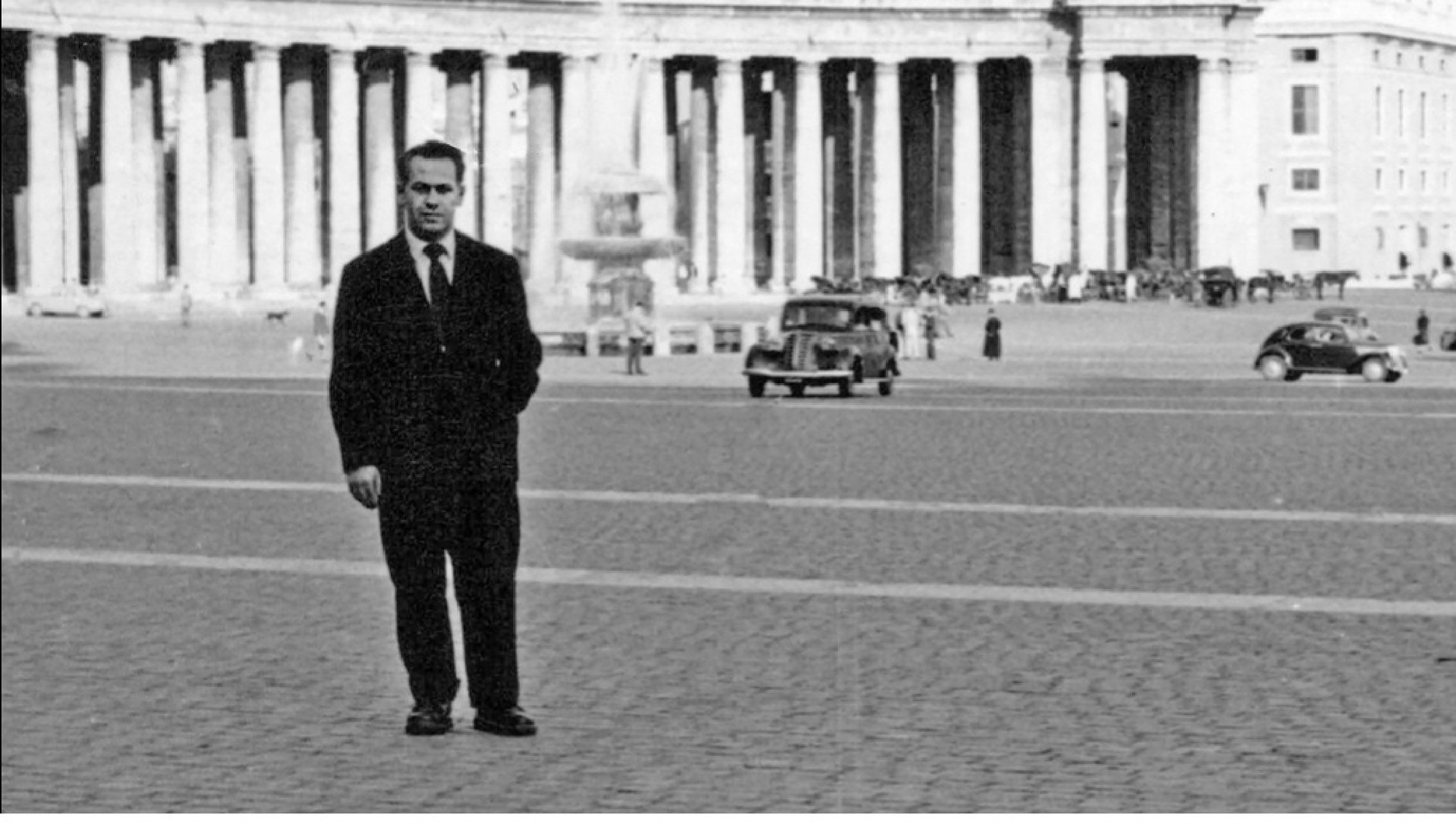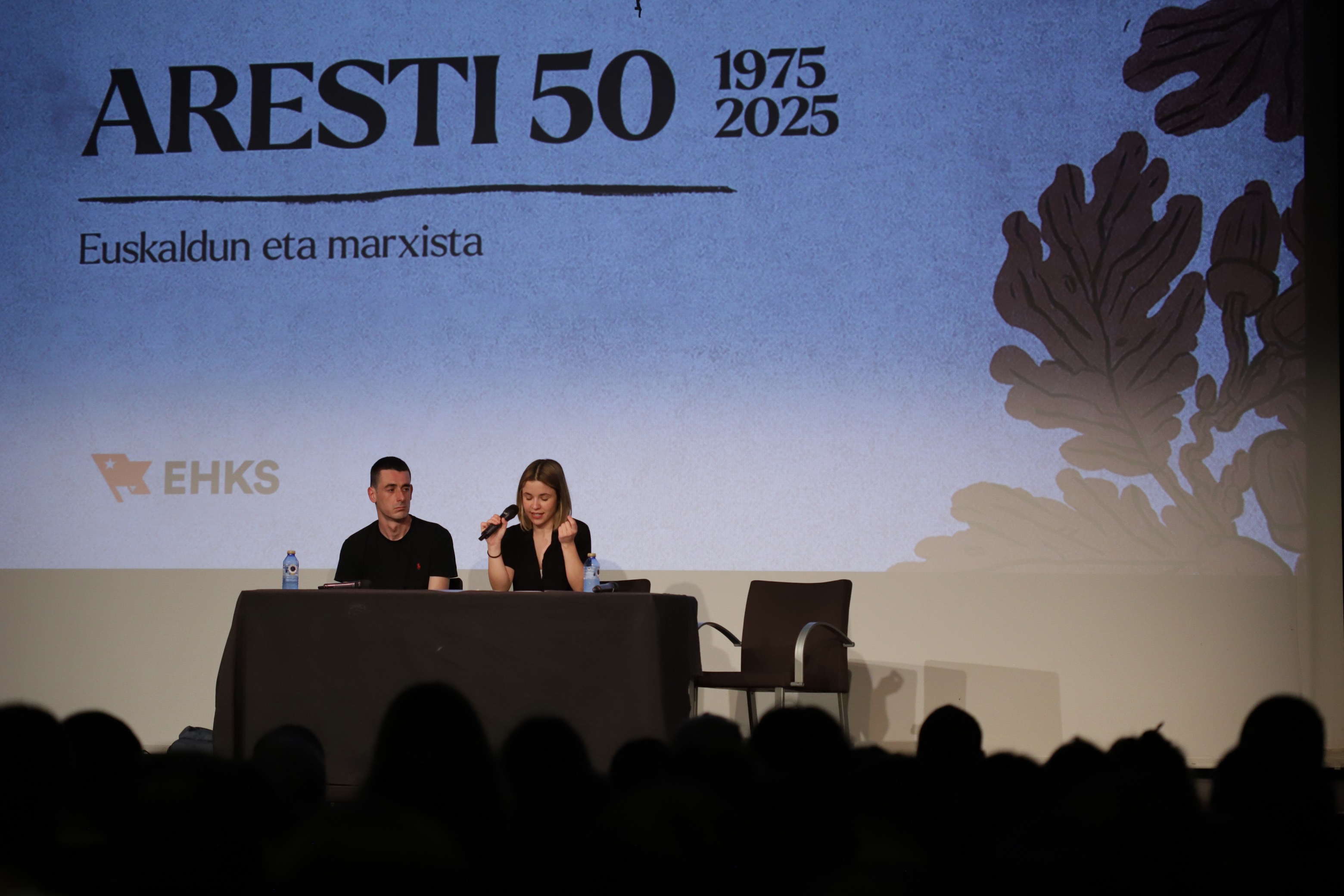“Our war has been more complex and the most truthful story”
- Between Donostia-San Sebastian and Otzeta, between our time and the War of 36, between a degenerated adult writer and a brilliant teenage student, is the latest novel published by Ramon Saizarbitoria, Lili eta biok (Erein, 2015). In an interview with Brussels, Ortuzar explained that he has written more free after marking a milestone in his career in 2012 with Martutene and starting his career.

Faustino Iturbe is the protagonist of the novel in a rather dilapidated situation. After meeting young Lili, the singer will start recovering from 22:00. How would you describe the relationship between them?
I don't know if that's a topic that's been caught and I'm really interested in it: it's written in humor and I've realized that for people it's frustrating, they don't usually like jokes and less when they're semiserious, when it's not clear. I would say that the Basques have problems there, above all. The type is a multi-ill, we do not know what disease it is, it has so many… And it is true that there is a fantasy, that is, that the woman, and in this case the girl, saves us.
This idea also featured in Martutene.
Yes, there too, Lynn urges the doctor to confess his guilt and to face the events, as in this case Lili does with Faustino. But in the relationship between Faustino and Lili there is also a pedagogical desire: to do for the young people he wanted, because if he did not have that will he would not have written some passages.
Which one?
Well, to repeat more than once that, for example, we have to free ourselves from family history. That in history we can choose our ancestors, without that “my father was a carlist” or “my mother is a patriot”. After all, we have been taught that we come from the Santa Cruz cure and, frankly, I think we have more interesting characters. I think the Liberals here are more recent, what do you want me to say?
"Throughout history we can choose our ancestors, 'my father was a carlist' or 'my mother is a patriot' without her burden."
Why is it problematic to say so?
Precisely because they were heterodox in ours. We have always been under the power of priests, of many kinds of priests.
Let's go back to the relationship. What's between Faustino and Lili?
I wanted to express something from the other side of the lolita: a man's relationship with a girl, in a way pure.
But it suggests the possibility of another kind of relationship, right? Isn't that game?
Yes, the reflection of man, who sees her as a woman, now more beautiful, then smaller… I have also wanted that tension, tell the reader if it could be that other.
But what I explain most is how bad man is in being a man. It seems to me that we are not improving, that in these times new forms of machismo are being created, that we are going back on some things. In sport more and more males, dirtier… This is another subject, but for example the Real Sociedad: sociologically it is very interesting how the values of the Real, how not to be elegant, noble, dirty, etc., today are equivalents. In the newspapers they are given reed, almost until they are called nenars. And values like the ATLÉTICO de Madrid are called for. It should be the other way round, to show that in this savage situation our young people still have other values.
Juan Aramendia, “honored” Falangist of the novel, has another model of man.
It hasn't started to explode here, but I'm literally interested in these Falangists. The painter Jesús Olasagasti, architect José Manuel Aizpurua, was a member of the Gu association of Donostia-San Sebastián. They were very progressive from an artistic point of view. For example, they brought Picasso and others. They weren't Basque, of course, but they're interesting people.
The characters Rosarito and Lore also show the violence suffered by women in war and in everyday life.
A few years ago I had a figure: that the flags are embroidered by women, that the priests bless them and the men bleed them up. And I've realized that it's not, that the first victims of war are women, even though we're not told that story. Imagine, in Donostia we just read and heard how so many women in the city were raped.
I am also guilty of this violence that women suffer on a daily basis. As a man, I understand that women are scared, scared. That's explained a lot in the novel, for example in the elevator scene: you know you don't have to invite a teenager to take the elevator with you, because you can put it in a hurry. Those things are sad for men, right?
"I'm literally interested in the Falangists meeting in the Gu de San Sebastian association."
What does the 36th War have to appear in so many literary works? Have things not been properly told yet?
No, things are not addressed when they are needed. In all the novels my characters have that problem, in Martutene Abaitua and here Faustino Iturbe. With the war that has also happened: it has not been explained, there are still different versions; and beware, because in part they were the winners of the “losers” discourse after the first years. In the back of the 1960s, being a Francoist father wasn't meant to be proud.
In this sense, the report here has been made more by the losers, they were more sympathetic. But the truth wasn't told. For example, when they talked about anarchism, they didn't tell what role they had actually played.
Can we avoid these stories that separate good and bad from a clear line?
It seems like no, you have to make a simple story when things happen. The winner does his thing as soon as possible and the others do the opposite, it is also simple.
Here the exception is the nationalists: we have always been told that they acted against Franco, but also against those next door, because they wanted to commit barbarities. The priest killed Franco and the others also did not want them; and the nationalists did not want war; and the doubts, did not want to throw away the bridges of the people; and the following said “you are traitors”… Our war has been more complex and the most truthful story. It wasn't like the movies, and that's very important in our narrative.
"We've all lost the coolness of criticism. We also need prudence, but I think we're going through it."
Will the account of the conflict in recent decades not fall into Manichaism as well?
I would not like it, because otherwise in thirty years, you and a couple of how I will be here talking about our roll.
But it seems that an empty terminology has prevailed that covers everything.
I recently attended such a meeting and I found it difficult to speak. Because of course, I spoke from my feelings, but I saw that the speeches are so structured, the terminology so precise and so special… I was embarrassed to speak. There are a lot of professionals around it. I would say that we talk too little about each other, and that there is too much talk at that level. I don't know if things are going well.
Can literature play a role in this situation?
It may seem like a polyhedral vision, although historians have to say the essentials. I cannot understand how there are so many difficulties in making a consensus in the historical discourse, as they cannot be agreed in the middle schools a dozen schools that students have to study on this subject. Then, the nuances, the grays, etc., can be put in the literature.
"I think we have to use a novelty instrument; I'm pretty ruthless about self-training."
The character of Faustino Iturbe is the indispensable element for uniting all the pieces of history. The writer therefore has a role.
There's a kind of cartoon: the family and Lili themselves think that when the writer tells that story, it'll be there. That's fantasy, because that's also where we've lost a lot. There is a scene in which Pereira de Antonio Tabucchi says: Georges Bernanos, although right-wing, offers his version of the Civil War describing the Falangist barbarities. And in France, it's "Bernanos dixit," its word has a lot of weight. That has been lost. In the past there were Partriarchal writers, you couldn't imagine them saying what they were saying for political interests.
The echo is that grandpa gives Faustino Iturbe such an importance. But at the end of the day it is a game, as a coincidence with the protagonist.
They follow each other…
The role of the novelist is also to report things in a novel way. I think we have to use that instrument, as the painter has to know how to control the paintings. Although so far everything is happening, I believe that technique is necessary. I've done my best to engage in caricature.
I'm pretty ruthless about automating. Because with fiction, we seem to have a clear agreement: this, in principle, is an invented agreement. And then there was the "literature of the self" or the biography: I pledge to tell the truth. And now comes the autofication and it happens to me that I had to bark the cars and not the bikes what the dog didn't learn: when the motorcycle passes, it doesn't know what to do.
"To enjoy culture, just like sex, you have to learn"
You have kept the cross-sectional style and the rigor in the description of scenes, but there are more straight dialogues than Lili and Bioken with respect to your previous work.
Style along the way makes me face reality, language. I live in San Sebastian and many times I do not find it plausible that they offer me some dialogues in Basque. I know that it can be done with conviction, as Koldo Izagirre told us. And so have I. It starts every day, for example; in Donostia you can make a novel only in Euskera, but it's more complex.
In addition, it also happened to me after eleven steps, that I made Hearts two freer; and now I also started taking myself off Martutene. I have not been able to put the rules that the Román nouveau put on me to write a completely free novel, but I have been freer.
As free as I can?
Yes, what we say and write is increasingly measured, heterodoxia is more repressed; and in our country we are all slaves to powers. If we are not directly our father, and if we do not receive a subsidy it is the following… And then there is a political correction: nothing can be said, you immediately touch the slippery terrain. We have all lost the freshness for criticism. It is also true that caution is needed, but I think we are going through it. As we are also growing and normalizing, we are collecting the evil, the evil and the damage of all, for example, the wager of the majority. Is it good because people like it? I believe that we must tell young people that we must learn to enjoy culture, as well as sex.
"Innovative quality things must mark the way in culture"
The normalization of the Basque Country often justifies this cultural model conceived for the majority consumption. What do you think?
I believe that the recovery of the Basque Country came along the other way, through modernity. And I always mention the model of the ikastolas: people chose the ikastolas because they were in Euskera, yes, but also because the teaching was more advanced, more modern, and because the teachers were more committed. It was a revolution before the Spanish school. In the literature, and the same thing: change did not come along the path of the popular theater of the 19th century and the beginning of the 20th, but by modernity. Then people follow it, but the road must be marked by something innovative and quality. Experience also shows this.
Now that everyone has become more Franciscan than the Pope, it’s worth remembering our unsurpassed classics. There was one in the 17th century, his grace was Arnaut Oienart. And since we can’t immerse ourselves in all his works, today we will praise O.ten youth in... [+]
Aurreko tertuliako galderari erantzuteko beste modu bat izan zitekeen, akaso modu inplizituago batean, bigarren solasaldi honetako izenburua. Figura literarioaz gaindi, pertsonaia zalantzan jartzeko, edo, kontrara, pertsonaiaren testuingurua ulertzeko saiakera bat. Santi... [+]
Astelehen honetan hasita, astebetez, Jon Miranderen obra izango dute aztergai: besteren artean, Mirande nor zen argitzeaz eta errepasatzeaz gain, bere figurarekin zer egin hausnartuko dute, polemikoak baitira bere hainbat adierazpen eta testu.
Martxoaren 17an hasi eta hila bukatu bitartean, Literatura Plazara jaialdia egingo da Oiartzunen. Hirugarren urtez antolatu du egitasmoa 1545 argitaletxeak, bigarrenez bi asteko formatuan. "Literaturak plaza hartzea nahi dugu, partekatzen dugun zaletasuna ageri-agerian... [+]
1984an ‘Bizitza Nola Badoan’ lehen poema liburua (Maiatz) argitaratu zuenetik hainbat poema-liburu, narrazio eta eleberri argitaratu ditu Itxaro Borda idazleak. 2024an argitaratu zuen azken lana, ‘Itzalen tektonika’ (SUSA), eta egunero zutabea idazten du... [+]























